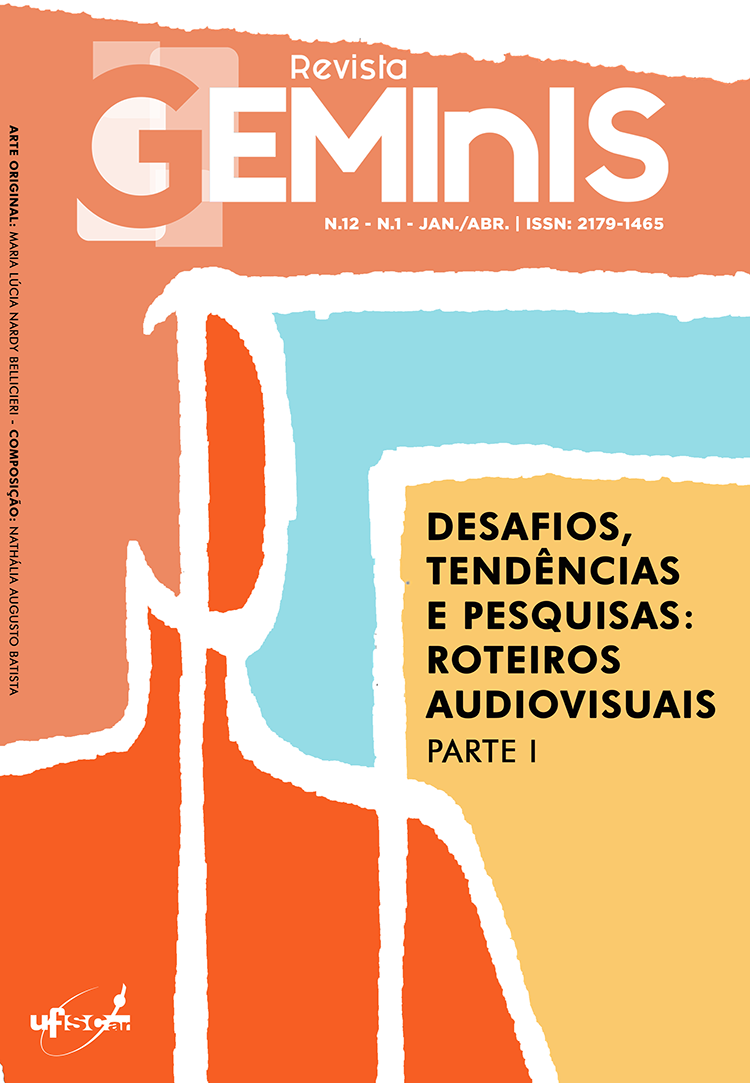“THAT’S A SEXIST TERM!”
THE IRONIC FEMINISM OF THE TELEVISION SERIES CRAZY EX-GIRLFRIEND
DOI:
https://doi.org/10.53450/2179-1465.RG.2021v12i1p247-274Keywords:
Feminism, postfeminism, Irony, Musical, Crazy Ex-GirlfriendAbstract
The present paper aims to explore what we call “ironic feminism” from the TV show Crazy Ex-Girlfriend (The CW, 2015-2019), from the perception that the series uses irony as a device to present critical counterpoints to the narrative itself. Our analysis focuses on the musical numbers of the show, which, as Ford & Macrossan (2019) argue, is where this irony materializes. Our argument starts from the hypothesis that irony is a complex narrative resource, used by the series to incorporate the debate about gender in a funny way and supported by a lexicon of jargon and burning themes in contemporary quarrels.
Downloads
References
ARTHURS, Jane. Sex and the city and consumer culture: remediating postfeminist drama. Feminist Media Studies, n. 3, v. 1, p. 83–98, 2003
BANET-WEISER, Sarah. Empowered: Popular feminism and popular misogyny. Durham & Londres: Duke University Press, 2018.
CARREGA, Jorge M. Neves. O integrated dance musical como “obra de arte total” no cinema clássico de Hollywood. ALICERCES: Revista de Investigação, Ciência, Tecnologia e Arte, n. 6, p. 149-159, 2016.
COHAN, Steven. Part One: Generic Forms – Introduction. In: COHAN, Steven (ed.). Hollywood Musicals, The Film Reader. Londres & Nova Iorque: Routledge, 2002, p. 17-18.
DYER, Richard. Entertainment and Utopia. In: COHAN, Steven (ed.). Hollywood Musicals, The Film Reader. Londres & Nova Iorque: Routledge, 2002, p. 19-30.
FALUDI, Susan. Backlash: The Undeclared War Against American Women. New York: Crown, 1991.
FELINTO, Erick. Videotrash: o YouTube e a cultura do “spoof” na internet. Galáxia, São Paulo, n. 16, p. 33-42, 2008.
FEUER, Jane. The Hollywood Musical. 2nd ed. Bloomington: Indiana University Press, 1993.
FORD, Jessica; MACROSSAN, Phoebe. The musical number as feminist intervention in Crazy Ex-Girlfriend. Australasian Journal of Popular Culture, v. 8, n. 1, p. 55-69, 2019.
GAY, Roxane. Bad Feminist: Essays. Nova Iorque: Harper Perennial, 2014.
GILL, Rosalind. Post-postfeminism?: new feminist visibilities in postfeminist times. Feminist Media Studies, v. 16, n. 4, p.1-21, 2016.
HORN, Katrin. “Period Sex”: Crazy Ex-Girlfriend and the Feminist Politics of Offence. In: GRAEFER, Anne (ed.). Media and the Politics of Offence. Cham: Palgrave Macmillan, 2019, p. 127-145.
HUTCHEON, Linda. Teoria e política da ironia. Belo Horizonte: Editora UFMG, 2000.
LEAL, Tatiane. A invenção da sororidade: sentimentos morais, feminismo e mídia. Tese (Doutorado em Comunicação e Cultura), Escola de Comunicação, UFRJ, 2019.
_______. A mulher poderosa: construções da vida bem-sucedida feminina no jornalismo brasileiro. Dissertação (Mestrado em Comunicação e Cultura.), Escola de Comunicação, UFRJ, 2015.
LOTZ, Amanda. Postfeminist television criticism: rehabilitating critical terms and identifying postfeminist attributes. Feminist Media Studies, n. 1, v. 1, p. 105–121, 2001.
_______. Redesigning women: television after the network era. Champaign: University of Illinois Press, 2006.
MATUSITZ, Jonathan; PAYANO, Pam. Globalisation of popular culture: From Hollywood to Bollywood. South Asia Research, v. 32, n. 2, p. 123-138, 2012.
McROBBIE, Angela. Post‐feminism and popular culture. Feminist media studies, v. 4, n. 3, p. 255-264, 2004.
_______. Notes on the perfect: Competitive femininity in neoliberal times, Australian Feminist Studies, v. 30, n.83, pp. 3–20, 2015.
MESSA, Márcia. As mulheres só querem ser salvas: produção, texto e recepção de Sex and the city. In: ESCOSTEGUY, Ana Carolina. (org.). Comunicação e gênero: a aventura da pesquisa. Porto Alegre: EDIPUCRS, 2008. p. 131-168.
MINOIS, George. História do riso e do escárnio. São Paulo: Editora UNESP, 2003.
MODLESKI, Tania. Feminism without women: culture and criticism in a “postfeminist” age. New York: Routledge, 1991.
MUNRO, Ealasaid. Feminism: A Fourth Wave? Political Insight, v. 4, n. 2, p. 22-25, 2013.
PINHO, João Pedro. A dramédia em Girls: Da euforia à disforia, do episódico ao serializado. 68f. 2018. Monografia (Graduação) – Instituto de Arte e Comunicação Social, Universidade Federal Fluminense. Niterói, 2018.
SOUZA, Christine Veras de. O show deve continuar: o gênero musical no cinema. 2005. 300 f. Dissertação (Mestrado em Artes Visuais) – Escola de Belas Artes, UFMG, Belo Horizonte, 2005.
Downloads
Published
How to Cite
Issue
Section
License
Authors who publish in this journal agree to the following terms:
a. Authors retain copyright and grant the journal the right of first publication, with the work simultaneously licensed under a Creative Commons Attribution License that allows sharing of the work with acknowledgment of authorship and initial publication in this journal.
b. Authors are authorized to assume additional contracts separately, for non-exclusive distribution of the version of the work published in this journal (eg, to publish in an institutional repository or as a book chapter), with acknowledgment of authorship and initial publication in this journal.


